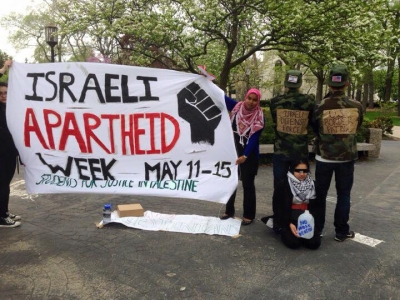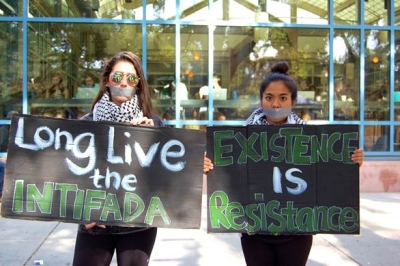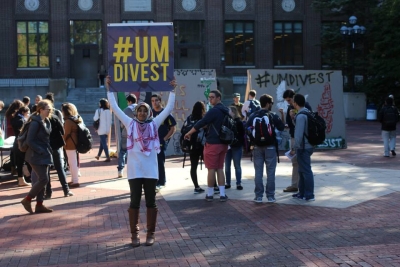by: David Robbins
March 08, 2016
By Jonathan Greenblatt
CEO of the Anti-Defamation League
This blog originally appeared on Medium
Political movements often depend on spoken or unspoken hatreds to perpetuate themselves.
Often, however, they can use ambiguity to mask these motives and appeal to a broader audience.
However, sometimes, when haters show their true colors, onlookers and fellow travelers can see through ambiguities to the unsavory aims of the causes which they’ve lent their support.
The Boycott, Divestment, Sanctions (BDS) movement against the State of Israel is undoubtedly spreading on U.S. campuses, in mainstream Protestant circles and in universities and unions in Europe. One element explaining the growth of BDS is frustration with the stalemate that has taken hold between Israelis and Palestinians.
It is understandable that in the face of diplomatic deadlock, movements that promise easy solutions and simplistic narratives gain steam. Indeed, the belief that Israel, as the occupier and stronger party, needs to act, combined with the appeal of an ostensibly non-violent movement like BDS – one that worked so well to bring an end to the apartheid regime in South Africa – makes for a compelling case for action.
Yet, any serious observer would admit that the apartheid analogy is flawed to its core. The conflict between Israel and the Palestinians is not an issue purely demarcated along racial lines. It is a national conflict between two peoples, a conflict for which each side bears responsibilities.
The reality is complicated by the fact that Israel has on several occasions presented the Palestinians opportunities to end the occupation and build an independent Palestinian state. One can argue with the terms proposed by both sides, but the stark truth of several rounds of failed negotiations reveals mutual culpability in the current status quo. And the ongoing incitement of the Palestinian leadership contributes as much if not more to the diminishing public will and widening diplomatic impasse as the actions of the Israeli government.
So, the keys to the two-state solution are kept by both Israel and the Palestinians.
But many who are swept up in its currents do not look closely at the desired end-state of the BDS movement. Many envision a scenario in which Israel, compelled by pressure, would be more forthcoming to the Palestinians and ideally a two-state solution could result. One might not agree with this logic, but we should note that, at least among many young Jews, it is animated by a desire for justice. I believe it has impelled groups such as J Street and a number of other emerging grassroots initiatives in the Jewish community. Even if we disagree, even we should acknowledge the earnestness of their motives.
Indeed, the BDS movement has been able to capitalize on attracting to its ranks many who legitimately seek a lasting peace between the Israel and the Palestinians. But it’s crucial to note – this end state is not what BDS seeks.
Nothing illustrates this better than the stance of the originator and main intellectual driver of the BDS movement, Omar Barghouti, and his reaction to the views expressed by two professors in support of boycott.
These professors, Steven Levitsky and Glen Weyl published an article in the Washington Post endorsing boycott as a way to pressure Israel in its policies toward the Palestinians. Self-described “life-long Zionists” seeking a two-state outcome, their endorsement of the boycott represents well a variation of the “pressure school” which seeks through pressure to change Israel’s behavior and approach to negotiations.
Regardless of the validity of their ideas—and I have deep doubts over the ability to achieve their desired outcome through one-sided penalties against Israel—what is telling is Barghouti’s response.
In his article, “You can’t save Israel from itself by appropriating BDS,” Barghouti slams the professors. He calls out this “Zionist” endorsement of BDS an appropriation, since it is calculated, in the final analysis, at achieving a resolution of the Israeli-Palestinian conflict.
Yet, BDS orthodoxy, Barghouti openly acknowledges, does not seek this goal. Barghouti argues that it is not the occupation that is the challenge but Israel’s very existence as a Jewish State.
Barghouti is transparent in his views and in his aims, and this should be instructive to any potential supporter of BDS. He speaks of Israel as “criminally built.” He refers to Israel itself – not the territories occupied in 1967 after the Six Day War – as an “apartheid” and “colonial-settler” regime.
And he spells out in no uncertain terms that his ideology – the ideology of BDS – is opposed to the formula achieved at Oslo and long since adopted by the international community—the resolution of the Israeli-Palestinian conflict by the creation of a Palestinian state to live side-by-side with Israel. Barghouti, tellingly, writes:
“Ending the 1967 occupation, even if it included East Jerusalem, at best addresses most of the rights of only 38% of the Palestinian people – those living in the OPT (occupied Palestinian Territory). What of the UN-stipulated rights of the remaining 62% of the Palestinian people (12% are citizens of current Israel and 50% are in exile who are entitled to their right of return) and what of the right of return of more than 40% of the Palestinians in the West Bank and Gaza who were ethnically cleansed during the Nakba and denied their right to go home?”
It is fair to expect Israel to live up to a policy that can accommodate the eventual emergence of a Palestinian state—and to expect equally that the Palestinians will act in accordance with a two-state vision.
But Barghouti spells out here that what he imagines as ‘justice’ is not merely the achievement of self-determination for the Palestinian people through the creation of an independent state. No, he longs for the right of any Palestinian living under the Palestinian Authority to “return” to areas that now comprise Israel.
In other words, BDS seeks to eradicate the Jewish state by bringing about an end to the self-determination for the Jewish people through the return of all five million Palestinian refugees.
Of course, the refugee issue has since their inception been a core component of bilateral negotiations between Israelis and Palestinians. And, any conceivable agreement between the parties requires that the plight of Palestinians refugees and their descendants must be addressed. Numerous international efforts have acknowledged that their needs will be predominantly accommodated within a future state of Palestine.
Among those who support BDS, there are undoubtedly some who seek Israel’s demise. But for the multitude of those who jump on the BDS bandwagon because they see it as a non-violent way to fast-track an end to the occupation, they need to know they are being taken for a very dangerous ride. They support the politics of Israel’s destruction, a movement of anti-normalization which Israel which is anathema to negotiation, compromise, and conflict resolution.
That’s something that the vast majority of BDS supporters would reject if only they clearly understood it.
So, even as we recognize the misguided aims of BDS and step up our efforts to defeat its ideology, it is a deeper understanding – not simplistic slogans – that are needed to navigate the aspects of this complex challenge.
That is why ADL has joined with the Reut Institute in a new effort aimed at examining the entire array of factors driving the growth of BDS campaigns, an initiative that will help parse those who are genuinely committed to peace – even if their views are different from our own as to how to get there – from those who mean to inflict grave harm.












